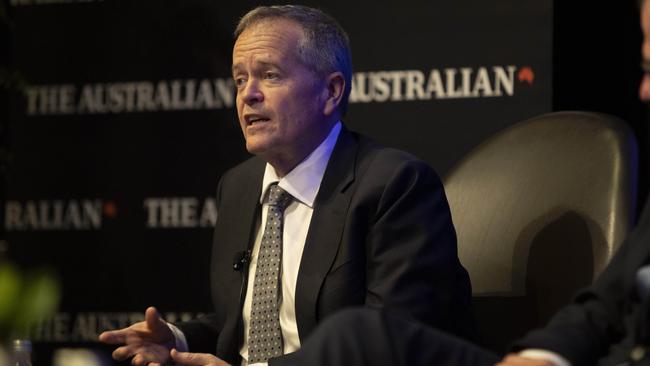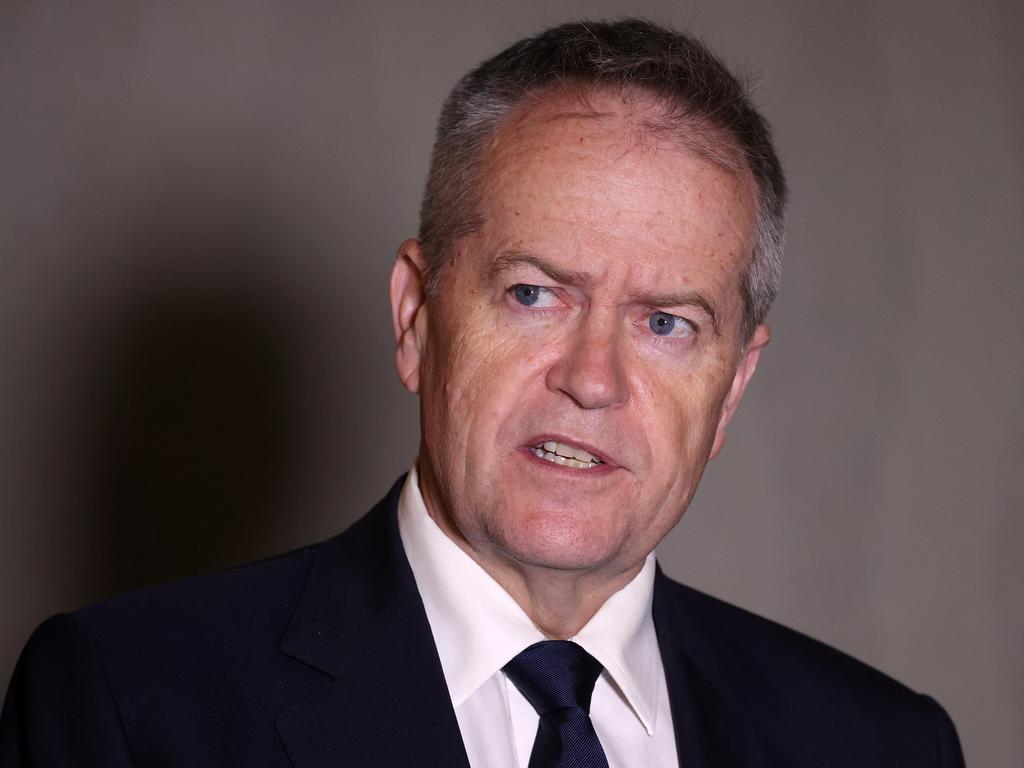Bill Shorten admits push to curb NDIS cost growth
Bill Shorten has for the first time flagged that moderating cost growth in the National Disability Insurance Scheme is a key priority for the Albanese government.

Bill Shorten has for the first time flagged that moderating cost growth in the National Disability Insurance Scheme is a key priority for the Albanese government as it looks to ensure the scheme remains sustainable.
The NDIS Minister highlighted “spiralling numbers of children with developmental delay” entering the scheme as an issue, calling on the states to step up and do more to support them outside the scheme. One in 11 boys aged five to seven in Australia is now on the NDIS.
Delivering a keynote speech to The Australian-Melbourne Institute Outlook conference, Mr Shorten said the scheme was not properly serving the people it was originally designed for and needed to be fixed.
One of the key changes needed was pulling back the current cost growth trajectory of the NDIS, Mr Shorten said, alongside restoring trust in the scheme and delivering better outcomes for participants.
“It is growing in its cost base too quickly,” Mr Shorten said. “I want to moderate cost growth.”
With the numbers of young people with autism and psychosocial conditions driving the faster-than-anticipated growth in NDIS numbers, Mr Shorten said it was time more services and supports were delivered to young people from outside the scheme.
“For example, we need the schools system to do more for the spiralling numbers of children with developmental delay entering the NDIS – more than 47,000 at the end of June,” he said. “Put simply, the NDIS was never intended to be the only lifeboat in the ocean.”

Anthony Albanese offered his full support for the NDIS as one of a number of social policies that were a measure of equity in the nation. “At budget time, we can all fall into the trap of talking about these four things simply as a set of figures,” the Prime Minister said. “But that’s not right. National security, Medicare, aged care, the NDIS: these are essential to the safety of our people, fundamental to the health, strength and fairness of our society.”
Last week’s federal budget revealed the NDIS, which will cost the federal and state governments $35.5bn this financial year, is on track to hit $52bn by 2025-26, dwarfing the costs of both Medicare and aged care.
Longe- term Treasury forecasts suggest the federal government’s contribution to the scheme will grow by almost 14 per cent a year for the next decade, with total scheme costs approaching $100bn by 2032-33. The NDIS, which became operational in 2013, currently has 555,000 participants. Its annual financial sustainability report suggests numbers will reach almost 860,000 by 2030.
More young people with diagnoses of autism and psychosocial disorders are entering the scheme.
About a third of current participants have an autism diagnosis and four in 10 are aged 14 and under.
Once on the NDIS, participants have uncapped access to support to deliver an improved quality of life and greater independence, a more attractive option than scarce community and educational supports outside the scheme. Mr Shorten said the NDIS “needs to get back to an investment approach to supporting people with disability”.
“If we invest effectively – break down barriers that prevent people with disability from participating in social and economic life – we also generate an investment return for the community,” he said.
“The NDIS has already improved workforce participation for participants and their families. More than twice as many participants aged 15 to 24 are working than before they entered the scheme. And we know that parents with a child who is part of the NDIS report a 24 per cent increase in employment.”
The minister said he was also determined to end fraud and waste, pointing to a new $138m investment in a fraud taskforce to crack down on organised crime infiltrating the scheme.
“Stealing from vulnerable Australians is one of the lowest acts imaginable and I just won’t have it,” he said.
Mr Shorten said the government’s newly announced review of the NDIS, brought forward by a year and co-chaired by longtime disability advocate Bruce Bonyhady and former senior bureaucrat Lisa Paul, had been tasked “to see where the scheme has gone wrong and propose solutions”.
Mr Shorten emphasised that “people with disability are not to blame for any inadequacies in the current design of the NDIS”, and believed innovative approaches to care support would be critical to its sustainable future.
Professor Bonyhady said considerations of the value of the NDIS as a public policy required more than simply looking at its cost.
“The terms ‘costs and sustainability’ are being used interchangeably when in fact they are very different,” he said.
“When it comes to the NDIS, we need to look at how the scheme is supporting the independence of people with disability and their economic and social participation as well as ensuring that costs are affordable, under control and represent value for money.”







To join the conversation, please log in. Don't have an account? Register
Join the conversation, you are commenting as Logout